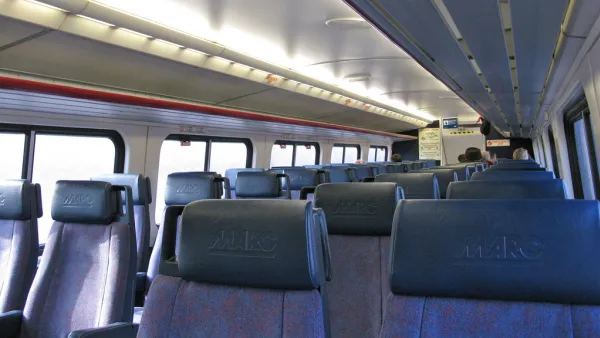Irvin Dawid discovered Planetizen when a classmate in an urban planning lab at San Jose State University shared it with him in 2003. When he left San Jose State that year, he took with him an interest in Planetizen, if not the master's degree in urban & regional planning.
As a long-time environmental activist, he formed the Sustainable Land Use committee for his local Sierra Club chapter and served six years on the Bay Area Air Quality Management District’s Advisory Council from 2002-2008. He maintains his interest in air quality by representing Sierra Club California on the Clean Air Dialogue, a working group of the Calif. Environmental Dialog representing business, regulatory and public health/environmental interests.
Major interests include transportation funding, e.g., gas taxes, vehicle miles traveled (VMT) fees, road tolls and energy subsidies that lead to unlevel playing fields for more sustainable choices.
He hails from Queens (Bayside) and Long Island (Great Neck); received an AAS in Fisheries & Wildlife Technology from SUNY Cobleskill and a B.S. from what is now Excelsior College.
After residing for three years on California’s North Coast, he’s lived on the San Francisco Peninsula since 1983, including 24 years in Palo Alto. Home is now near downtown Burlingame, a short bike-ride to the Caltrain station.
He’s been car-free since driving his 1972 Dodge Tradesman maxi-van, his means to exit Long Island in 1979, to the junkyard in 1988.
Major forms of transportation: A 1991 'citybike' and monthly Caltrain pass, zone 2-2. "It's no LIRR, but it may be the most bike friendly train in America."
Irvin can be reached at [email protected]
New Report Calls Attention to Need for Critical Bridge Funding
It may have been serendipity, but Transportation for America's new report on the sorry state of America's bridges, 11% are structurally deficient, was released the same day that a temporary replacement span opened on the Skagit River bridge in Wash.
Regulating Diesel Emissions: An Environmental Twofer
This toxic emission is not only a threat to public health but also the second largest contributor to global warming, according to CARB. A new study has found that regulations to reduce diesel emissions fight both climate change and air pollution.
Have You Noticed Fewer Cars on the Road Lately?
While the decline may not be visible, total auto ownership peaked in 2008 according to a new report by Michael Sivak of the University of Michigan's Transportation Research Institute. He set out to determine the cause - was it the economic recession?
Hybrid and Electric Vehicle Fees are Here to Stay, and Spreading
It may seem counter-intuitive to charge extra fees for the cleanest, most fuel-efficient vehicles on the road today - including those that qualify for a federal $7,500 credit. But ten states are doing just that to keep roads well-funded.

Commuter Rail Lines Multiply, But Where Are the Riders?
Despite a flurry of new commuter rail lines in operation, ridership increased a mere .5% during a record year for transit. Worse yet, some of the newer lines saw the greatest decreases. The answer: increase service to attract riders.

























